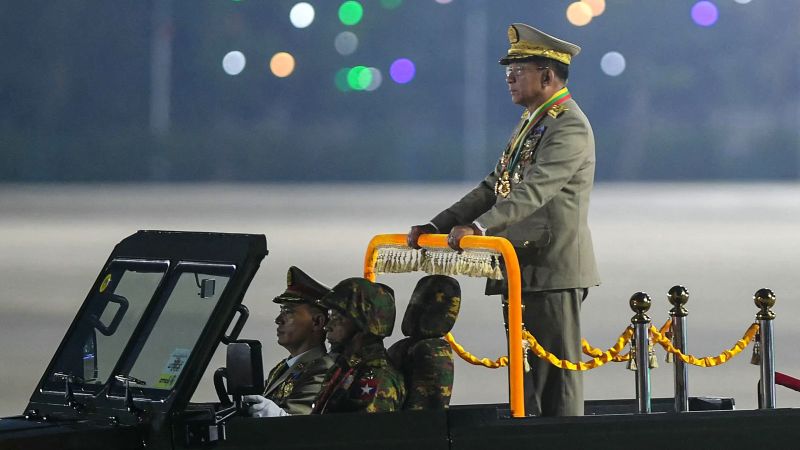Myanmar’s Junta Seizes on Trump Tariff Letter as Validation

A letter from former US President Donald Trump announcing new tariffs has been interpreted by the military junta in Myanmar as a sign of recognition and support. The letter, sent on August 1, 2023, imposes a tariff rate of 40 percent on Myanmar’s exports to the United States. Senior General Min Aung Hlaing, who leads the junta that seized power in 2021, expressed “sincere appreciation” for the communication, describing it as an encouraging invitation to engage with the US economy.
The military’s takeover led to widespread condemnation from the international community. Most Western nations, including the United States and the European Union, have not recognized the junta as Myanmar’s legitimate government. The military’s actions have sparked a protracted civil conflict, with various pro-democracy groups and ethnic factions fighting against the junta. Human rights organizations, including the United Nations, have accused the military of committing war crimes.
Junta’s Response to Tariff Announcement
In a statement reported by state media outlet Global New Light of Myanmar, General Min Aung Hlaing characterized the tariff letter as a positive engagement with the US. He suggested that a high-level negotiation team could be dispatched to discuss the matter further, signaling an eagerness to enhance bilateral relations. The general also urged the US to consider lifting economic sanctions, arguing that they hinder mutual interests and prosperity.
Despite the junta’s attempts to frame the tariff letter positively, the context remains grim. The military has faced significant backlash since its coup, which ended a decade-long experiment with democracy. The previous government, led by Aung San Suu Kyi and the National League for Democracy, won a decisive victory in the 2020 elections, a result that the military has disputed without credible evidence. Observers deemed that election largely free and fair, unlike the claims of fraud made by the junta.
Historical Context and Implications
The military’s power grab has led to a humanitarian crisis, with thousands displaced and numerous casualties reported. The junta’s leadership, particularly Min Aung Hlaing, has faced international isolation, with many countries withdrawing their ambassadors and limiting official contact. The military’s connection to Trump, while tenuous, provides them with a narrative of legitimacy in a world increasingly critical of their actions.
“The US needs to consider lifting and easing economic sanctions on Myanmar,” Min Aung Hlaing stated, emphasizing the need for collaboration.
In a curious nod to Trump’s past grievances regarding the 2020 election, Min Aung Hlaing drew parallels between challenges faced in both nations. He made unverified claims of electoral fraud in Myanmar, echoing Trump’s narrative of a stolen election. This tactic appears aimed at aligning the junta with Trump’s sentiments, perhaps in hopes of fostering a more favorable relationship.
The junta’s praise for Trump extended to his administration’s funding cuts to US media outlets like Radio Free Asia and Voice of America, which have been criticized for their independent reporting. Such cuts have been seen as a means to curb dissent and control the narrative in Myanmar, where press freedoms have drastically diminished since the coup.
As the situation in Myanmar evolves, the junta’s reception of Trump’s tariff letter highlights their ongoing struggle for international legitimacy. While they may spin this correspondence as validation, the broader implications of their actions continue to resonate negatively across the globe. The military remains under scrutiny for its human rights abuses, and the path to any meaningful diplomatic engagement remains fraught with challenges.






